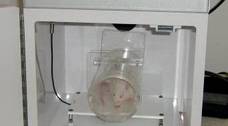
Pre-pulse Inhibition (PPI)
Animals will startle when exposed to a loud an unexpected burst of noise. The intensity of the startle response is reduced when the burst of noise is preceded by a weak and brief noise. This reduction in startle intensity is referred to as pre-pulse inhibition. It has been demonstrated that pre-pulse inhibition is impaired in people suffering from schizophrenia. Thus, animal models that show a similar deficit in pre-pulse inhibition are considered to be particularly useful and valid models of schizophrenia.
Latent Inhibition
Latent inhibition is a phenomenon that can be demonstrated within any Pavlovian conditioning paradigm. Animals are first given extensive pre-exposure to a Conditioned Stimulus (CS). The CS is then paired with an unconditioned stimulus (UCS). Latent inhibition refers to the fact that the association between the CS and the UCS is acquired less rapidly, in comparison to animals that do not receive CS pre-exposure. Several theories have been developed to account for this effect, although all share the common assumption that the animal learns to ignore the CS during pre-exposure because it does not signal anything important.


